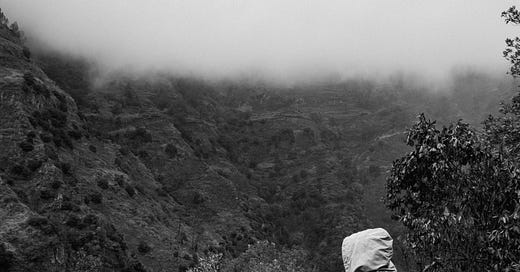In my essay earlier this Fall, "The Profane Presence of God," I wrote a line that I was nervous to publish because of how it might offend Christians. I published it anyway:
"If God has a favorite place to find us, then surely it is not inside of churches."
I find this to be more and more true. It proves out through the testimony of scripture. The majority of the most significant encounters with God happened in wild, lonely places—the eremos. Jesus himself, Jacob, Elijah, Moses, and on and on it goes. And it has proven out in my own spiritual journey as well.
Solitude, over the past few years, has become one of the most powerful spiritual disciplines in my life. There is great value in the corporate exercises of the Church, but there are some things that can only be revealed to us, and some things that can only be excised from us, in a place of deep aloneness with God.
Solitude is not just about being away from other people. It's about being deeply present with God, and with yourself. Solitude enables self-examination. It's where we can take an honest inventory of our thoughts, our motivations, and our hurts. True self-awareness is impossible without the reflection that solitude facilitates.
Recently I was giving a talk on the spiritual discipline of solitude, silence and stillness. I described the phases that I’ve learned to expect when I enter a time of solitude with God. I view them less as levels to climb and more as depths to sink down through.
The Hebrew word “Rapha” (as in “Jehovah Rapha”) means both “to heal” and “to sink down.” I love the image of sinking down into the healing presence of God.
6 Phases of Solitude
1 - The anxiety of inactivity
We live our lives in a state of constant activity, distraction, noise and input. Our minds rebel against the strangeness of quiet and stillness. Before solitude can shape us, we must weather this storm and decompress from our hyperactive norm.
2 - The therapeutic peace
The honeymoon phase. Once the surface noise in the mind has settled, we soak in the restorative peacefulness that our soul has been craving.
3 - The war zone
Our deeper demons emerge from their hiding places. There's no shallow noise or distraction to conceal them anymore. The worst parts of us convict us in the quiet.
4 - The nakedness
The dust settles and all that's left is the vulnerable, naked, authentic self. Separated from both the things we're proud of and the things we're ashamed of. The you that God knows. The you that you haven't seen in a while.
5 - The overwhelming kindness of God
The difficult, beautiful realization that God sees the real you. The you that you numb. The you that the demons accuse. The you that you don't visit often. And he loves you far beyond what your mind could ever grasp.
6 - The reformation
The striving ceases. And in the light of God's surpassing kindness, you are shaped and molded into something new again. Your identity heals from its wounds, returns to where it was meant to be, and is reformed.
Thank you for reading!
If this post spoke to you or challenged you, send it to a friend or share it on social media:
To receive more posts like these and join the community, subscribe now:
P.S.
Stay tuned for more posts on the spiritual discipline of solitude in the coming weeks.
If you want to go back and read the earlier essay I referenced, you can do that here:
The Profane Presence of God
One of the most harmful implications we make in the Church is that a service or sanctuary is where you go to experience God’s presence—as if His presence is not ablaze all around us, all the time.
Much love,
gb






First of all, I need to go back and read your earlier essay because I think “If God has a favorite place to find us, then surely it is not inside of churches” is spot on.
Secondly, the way you break down solitude makes it so palatable. When I find my life feeling overwhelming or moving nearer out of control, it always a reminder that I am not spending enough time in solitude with God.
Grateful to read this today. Feel like many could benefit from it.
Yes. This. Thank you.